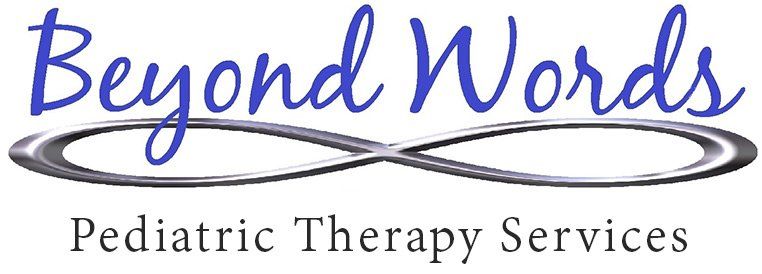Speech and Language Therapy
Synopsis of Language
This involves the acquisition of spoken and written language skills, which includes the ability to listen, process, speak, read, write and socialize! Our therapists at Beyond Words are able to target all areas of language that will allow your child to develop appropriate communication skills to succeed in life.
Areas We Address in Speech Therapy
Developmental Language Delay: The cause is typically unknown, but there are many factors that could lead to a child having difficulty reaching their developmental milestones, including, but not limited to: medical diagnoses, lack of environmental opportunities, sibling order, chronic ear infections, hearing loss, etc.
Receptive and Expressive Language Delay or Disorder:
Multi-faceted area involving various aspects:
- Pre-/para- linguistic communication skills are developed through various non-verbal activities.
- Phonology is important to the development of language because it relates to the ability to identify and discriminate between phonemes while listening.
- Syntax means the ability to understand and use proper sentence structure.
- Semantics is your vocabulary knowledge which is naturally acquired early on in language development, simultaneously with other areas of language.
- Literacy is tightly connected with the ability to develop language skills. Phonological Awareness breaks down early reading skills into categories that are specifically targeted to help children learn to read.
Pragmatic Language Disorder:
When children have difficulty socializing, making friends, or exhibiting appropriate "behaviors," they may have a Pragmatic Language deficit. There are 3 major areas that are considered when determining if a child has deficits in the area of Pragmatic Language.
Augmentative and Alternative Communication: Augmentative and Alternative Communication (AAC) includes any and all forms of communication, other than oral speech, that are used to express wants, needs, thoughts, and ideas. Naturally, a human being is able to provide AAC in their everyday communication using facial expressions, gestures, writing, and body language; in conjunction with their oral expressive communication.
Every person has the right to express themselves, socialize, and interact without relying on another person; AAC does this, allowing those who cannot communicate verbally the ability to communicate independently.
Schedule an Appointment
We Provide Personalized and One-On-One Care.
(409) 554-0689
(409) 554-0689
"Beaumont is lucky to have such a great facility. The speech therapists are caring professionals with years of experience."
- Mary M via Google
VISIT US
,
This is a placeholder for the Yext Knolwedge Tags. This message will not appear on the live site, but only within the editor. The Yext Knowledge Tags are successfully installed and will be added to the website.
This is a placeholder for the Yext Knolwedge Tags. This message will not appear on the live site, but only within the editor. The Yext Knowledge Tags are successfully installed and will be added to the website.
HOURS
This is a placeholder for the Yext Knolwedge Tags. This message will not appear on the live site, but only within the editor. The Yext Knowledge Tags are successfully installed and will be added to the website.
HOURS
This is a placeholder for the Yext Knolwedge Tags. This message will not appear on the live site, but only within the editor. The Yext Knowledge Tags are successfully installed and will be added to the website.
HOURS
This is a placeholder for the Yext Knolwedge Tags. This message will not appear on the live site, but only within the editor. The Yext Knowledge Tags are successfully installed and will be added to the website.
Monday
Tuesday
Wednesday
Thursday
Friday
Saturday
Sunday
This is a placeholder for the Yext Knolwedge Tags. This message will not appear on the live site, but only within the editor. The Yext Knowledge Tags are successfully installed and will be added to the website.
CONTACT US
This is a placeholder for the Yext Knolwedge Tags. This message will not appear on the live site, but only within the editor. The Yext Knowledge Tags are successfully installed and will be added to the website.
Hi. Do you need any help?
Privacy Policy
| Do Not Share My Information
| Conditions of Use
| Notice and Take Down Policy
| Website Accessibility Policy
© 2024
The content on this website is owned by us and our licensors. Do not copy any content (including images) without our consent.

Share On: